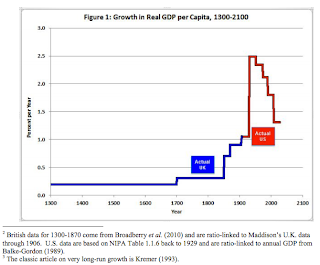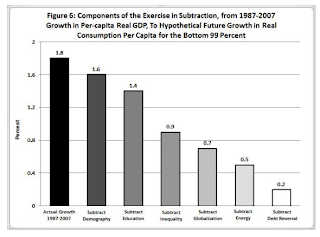Re: U.S. In Worse Fiscal Shape Than Greece?
I dunno, lek. I can drive 45 minutes (if there's no traffic) to get to a 'whole paycheck' and give (twice) my money to John Mackey instead (pick your billionaire). But the three choices (supermarkets) in town are going to make me decide between A1 and Lea and Perrins - Warren B or Warren B.
We've both been around the block a few times. It's not hard to remember back 20-30 years and think about a time when the supermarket was full of brands that were actually competing. Now-a-days you get a duopoly at best. Monopoly at worst.
It struck me driving down the DW Highway in old New Hampshire just how many of those once-competing stores were now owned by or selling stuff for the same people. Go by Jordan's Furniture near Spit Brook Rd, that's Warren B. Pampered Chef's up on the left. That's Warren B again. Home Depot on the right? Warren B - biggest shareholder. Then there's a Kaplan test prep joint on the right - Warren B again. Pass Shaw's a little further up - Ceberus. Chrystler Jeep Dodge dealership - Ceberus. Head out west to the hospital, and it's Ceberus again. Drive up to main street and pass more Ceberus rent-a-car joints like Budget at East Hollis St.
And that's not thinking about all the stuff on the shelves. The wrigley gum, duracell batteries, and all that other good stuff I listed that comes from Warren B.
I mean, I don't think there is a single American family who have gone a year without buying one or more items from Warren Buffet. I just don't think it's possible.
It would make for an interesting reality show trying to pull it off.
Originally posted by lektrode
View Post
We've both been around the block a few times. It's not hard to remember back 20-30 years and think about a time when the supermarket was full of brands that were actually competing. Now-a-days you get a duopoly at best. Monopoly at worst.
It struck me driving down the DW Highway in old New Hampshire just how many of those once-competing stores were now owned by or selling stuff for the same people. Go by Jordan's Furniture near Spit Brook Rd, that's Warren B. Pampered Chef's up on the left. That's Warren B again. Home Depot on the right? Warren B - biggest shareholder. Then there's a Kaplan test prep joint on the right - Warren B again. Pass Shaw's a little further up - Ceberus. Chrystler Jeep Dodge dealership - Ceberus. Head out west to the hospital, and it's Ceberus again. Drive up to main street and pass more Ceberus rent-a-car joints like Budget at East Hollis St.
And that's not thinking about all the stuff on the shelves. The wrigley gum, duracell batteries, and all that other good stuff I listed that comes from Warren B.
I mean, I don't think there is a single American family who have gone a year without buying one or more items from Warren Buffet. I just don't think it's possible.
It would make for an interesting reality show trying to pull it off.


Comment